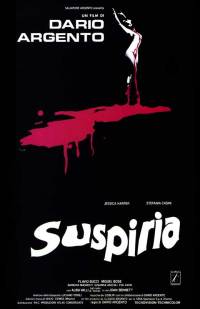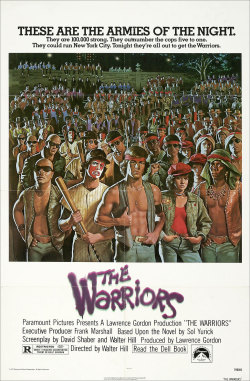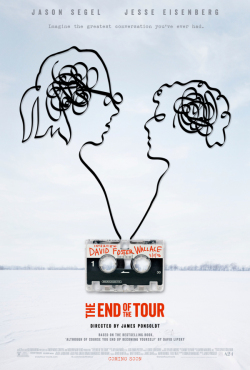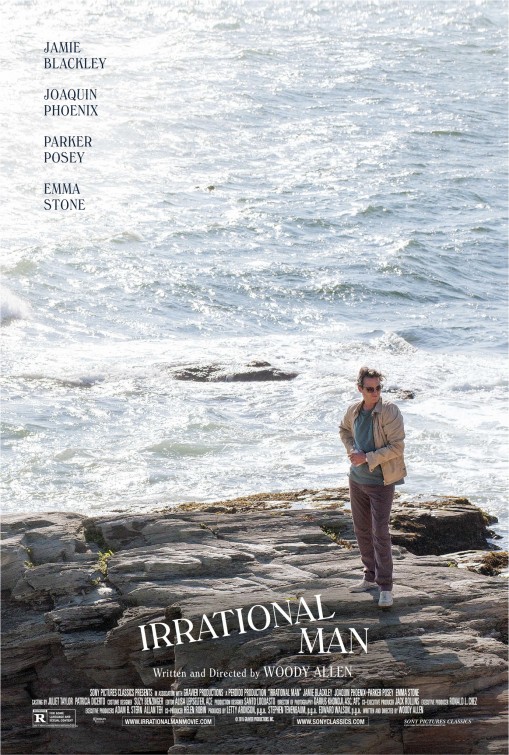IRRATIONAL MAN (2015, directed by Woody Allen, 96 minutes, U.S.< )
EXHUMED FILMS @ THE MAHONING DRIVE-IN THEATER
![]() BY DAN BUSKIRK FILM CRITIC A full 45 features into his directing career, Woody Allen returns with a solid entry in his late-career revival. Irrational Man certainly hits on many of the themes and totems we’ve seen explored in previous Allen films (existential ennui, May-September romance, murder plots et al) yet the film has enough fresh elements and performances to warrant turning yourself over to another of the Wood Man’s late-period dramas.
BY DAN BUSKIRK FILM CRITIC A full 45 features into his directing career, Woody Allen returns with a solid entry in his late-career revival. Irrational Man certainly hits on many of the themes and totems we’ve seen explored in previous Allen films (existential ennui, May-September romance, murder plots et al) yet the film has enough fresh elements and performances to warrant turning yourself over to another of the Wood Man’s late-period dramas.
Allen has told crime stories before, this is the first one he’s made that seems to channel Hitchcock’s psychological thrillers. Although Joaquin Phoenix’s philosophy professor Abe Lucas is the title character, the film is mainly seen through the eyes of his star-struck student Jill. (Emma Stone) Like us, she first finds the faith-rattled divorcée a charming  wreck. Abe has arrived at his little New England college (shot at Newport, Rhode Island’s Salve Regina University) to teach and finish his book and the whole faculty is full of whispery gossip about his past. Parker Posey is Rita, a married teacher who is looking to run-off with Abe but it is his love-struck student Jill who thinks that she is the one who can save him from his deep well of depression. Abe mopes and mopes about the state of the world but what finally gives Abe’s life meaning is something he overhears in a diner that compels him to plot a murder that he believes will make the world a better place. His demeanor lightens as his plan takes shape, raising suspicions in both Jill and Rita that all is not well in Abe’s increasingly light-hearted psyche.
wreck. Abe has arrived at his little New England college (shot at Newport, Rhode Island’s Salve Regina University) to teach and finish his book and the whole faculty is full of whispery gossip about his past. Parker Posey is Rita, a married teacher who is looking to run-off with Abe but it is his love-struck student Jill who thinks that she is the one who can save him from his deep well of depression. Abe mopes and mopes about the state of the world but what finally gives Abe’s life meaning is something he overhears in a diner that compels him to plot a murder that he believes will make the world a better place. His demeanor lightens as his plan takes shape, raising suspicions in both Jill and Rita that all is not well in Abe’s increasingly light-hearted psyche.
Sure, philosophers names are casually dropped, young girls find older guys irresistible and old jazz tunes appear in the score (lots of pianist Ramsey Lewis) but at its best Irrational Man makes us forget we’re watching a Woody Allen film. This is partially due to Woody’s exile from New York City but it is Emma Stone as much as leafy Newport that transports Woody’s film to fresh ground. Joaquin is fine displaying his patented Brooding Man Of Self-Doubt but it is really Stone who elevates every scene she is in, exhuming the honest emotion that lies beneath this age-old story of a man trying to dot the I’s and cross the T’s on his perfect murder plot. Despite Joaquin’s juicy role at the center it’s Jill reaction to Abe’s metamorphosis from lifeless depressive to reborn killer that gives the film the urgency to enliven its timeworn premise.
Just as the film threatens to take on larger dimensions Woody springs the final trap and brings this murder drama to a quick end. This keeps the film’s success on a modest scale yet gives more evidence that despite his ups and downs, 45 features later Woody has not lost his sense of purpose.
_________________________
It seems like every six months or so I’m terrorized by reports that a full service restaurant is going to be in the middle of the temple of cinema. You’ve heard about the places, they offer wait service from your theater seat to take your order mid-film and come back later with a stinky crabcake sandwich and an over-priced microbrew. In the old days the was a special venue for the easily-distracted theater goer. It had comfortable seats, one could strap on the feed bag during the show, you could talk, talk, talk and even make sweet love with your partner if the loins were a-burning. It was born right in Camden and it was called “The Drive-In.”
 How did this ever go out of style? Check your phone, make fun of the movie, snort and belch; you won’t bother anyone in the comfort of your automobile. The amount of space they needed is partially to blame for the drive-in’s demise but it you’re willing to travel a little a handful of outdoor screens still exist. The Mahoning Drive-in in Leighton (right next door to Jim Thorpe) is about 90 minutes from Center City in the Poconos and they have returned after a few seasons of darkness to provide the full drive-in experience. Actually a better drive-n experience than some of the dumps of my youth, Mahoning is actually spic and span with a very reasonable snack bar and a great sense of history towards the drive-in market.
How did this ever go out of style? Check your phone, make fun of the movie, snort and belch; you won’t bother anyone in the comfort of your automobile. The amount of space they needed is partially to blame for the drive-in’s demise but it you’re willing to travel a little a handful of outdoor screens still exist. The Mahoning Drive-in in Leighton (right next door to Jim Thorpe) is about 90 minutes from Center City in the Poconos and they have returned after a few seasons of darkness to provide the full drive-in experience. Actually a better drive-n experience than some of the dumps of my youth, Mahoning is actually spic and span with a very reasonable snack bar and a great sense of history towards the drive-in market.
Without a digital projector, The Mahoning Drive-in in Leighton PA (just next to Jim Thorpe) has been cut off from showing current blockbusters but this has forced them to get creative in their programming. They’ve tapped Exhumed Films, the Philly-area collective to supply those rare 35mm prints for their screening and this summer they have together delivering one of the odder cinematic spectacles around, making the drive-in an open-air repertory house celebrating great films from the past. This weekend gives us a Friday double-bill of horror director Dario Argento’s career apex Suspira with the beloved 1976 cult film Alice Sweet Alice, in a cut not available on home video. Saturday bring us irresistible gang film The Warriors and oddly enough Eddie Murphy’s live stand-up comedy feature from 1987, Raw. At the end of the month look out “Camp Blood” a weekend of camping-themed slasher films (including a triple-bill of Friday the 13th films) at Mahoning with on-site camping available for the strong of heart. Come on out, lose popcorn beneath your seats and help keep the drive-in tradition alive!
The Mahoning Drive-In is located at 635 Seneca Rd. (Off of Rte 443), Lehighton
___________________
DAVID EDELSTEIN: The tour in The End of the Tour is David Foster Wallace’s 1996 multicity promotion for his epic novel Infinite Jest, a fractured portrait of a manic culture and the biting loneliness at its heart. The movie, directed by James Ponsoldt from a script by the playwright Donald Margulies, depicts what happens when Wallace (Jason Segel) becomes a cog in the machine he’s attempting to deconstruct. He’s seen through the eyes of the writer David Lipsky (Jesse Eisenberg), who tags along to the last city, Minneapolis, for a Rolling Stone profile. Lipsky has just published his own novel to resounding crickets, and he oscillates between jealousy of Wallace’s sudden celebrity and a desire to live vicariously through it — to know what it’s like to be a literary sensation. Wallace, meanwhile, is visibly uncomfortable with his stardom, partly because he doesn’t want to be seen as comfortable with it and partly because he’s afraid he’ll be weakened by it existentially. He’s especially frightened of being on TV, which riveted him as a child and instilled in him the conviction that mainstream culture is evolving into an ever more efficient drug. He does, however, admit that he’d like to get laid more easily.
The End of the Tour is essentially a two-character piece in which every exchange is boldface, fraught. Wallace studies Lipsky studying him while Lipsky labors to find his story. The  film doesn’t tell you that Lipsky never found it, psyching himself out to the point where he didn’t even publish the piece. But he did release an annotated transcript of the interview after Wallace’s 2008 suicide under the title Although of Course You End Up Becoming Yourself. It’s not too revealing. Wallace is controlled, self-censoring, showing little of the tempestuousness that emerges in D.?T. Max’s biography Every Love Story Is a Ghost Story, let alone the philosophical daredevilry of a novelist striving to further the explorations of Thomas Pynchon and Don DeLillo. But Ponsoldt and Margulies have squeezed every last drop of subtext out of the material, and at times the movie’s small canvas feels momentous. They’ve found the inner tensions in people’s presentations of themselves in a way that’s positively Wallace-like.
film doesn’t tell you that Lipsky never found it, psyching himself out to the point where he didn’t even publish the piece. But he did release an annotated transcript of the interview after Wallace’s 2008 suicide under the title Although of Course You End Up Becoming Yourself. It’s not too revealing. Wallace is controlled, self-censoring, showing little of the tempestuousness that emerges in D.?T. Max’s biography Every Love Story Is a Ghost Story, let alone the philosophical daredevilry of a novelist striving to further the explorations of Thomas Pynchon and Don DeLillo. But Ponsoldt and Margulies have squeezed every last drop of subtext out of the material, and at times the movie’s small canvas feels momentous. They’ve found the inner tensions in people’s presentations of themselves in a way that’s positively Wallace-like.
Segel had me from the moment Wallace clumsily ushers Lipsky into his rural-Illinois home and says, “I feel like I should offer you tea or something.” The line means: How are we supposed to do this? His Wallace is lumbering, at a distance from his body, working to project earnestness after publicly rejecting irony as a soul-killing palliative — as well as contrary to the spirit of Alcoholics Anonymous, which likely saved his life. Segel’s delivery — with its built-in hesitation — suggests a man who’s always measuring himself against others. His self-deprecation is competitiveness redirected. MORE


